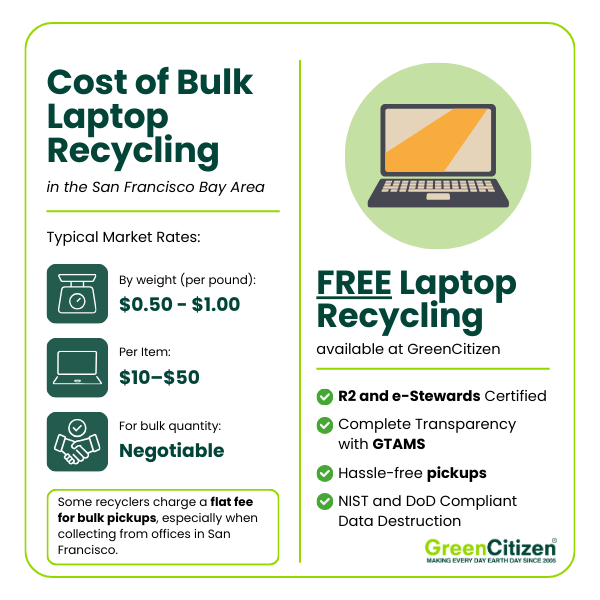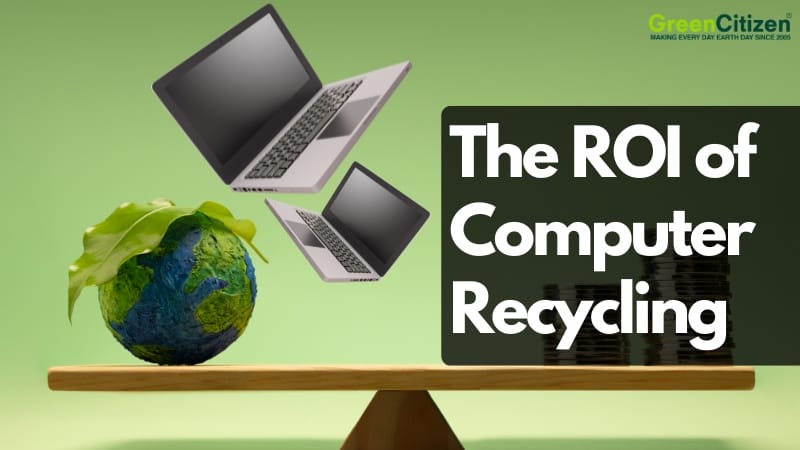When Bay Area businesses think about computer recycling, they often see it as a compliance checkbox or an environmental gesture. But in reality, the ROI of computer recycling is far more significant.
From avoiding fines as high as $70,000 per violation per day to preventing data breaches that cost U.S. companies an average of $9.48 million, responsible computer recycling is a financial strategy as much as an ethical one.
For tech firms, hospitals, startups, and financial institutions across San Francisco, San Jose, and Palo Alto, recycling computers responsibly can reduce storage costs, strengthen ESG reporting, boost employee retention, and even help win multi-million-dollar contracts.
In the Bay Area, where sustainability, compliance, and innovation collide, computer recycling is no longer a cost center — it’s a driver of profitability and long-term resilience.
Key Takeaway: Is Computer Recycling Worth It for Bay Area Businesses?
Yes — certified computer recycling delivers clear ROI. It prevents million-dollar fines and data breaches, eliminates storage costs, supports ESG goals, and even helps win contracts. What looks like an expense is actually a compliance safeguard, cost saver, and brand builder all in one.
Direct Financial ROI: How Computer Recycling Saves Bay Area Businesses Money

How Much Can Bay Area Businesses Save by Avoiding Fines and Penalties?
In California, tossing computers in the trash isn’t just careless — it’s expensive. Under Assembly Bill 245 (AB 245), the Department of Toxic Substances Control (DTSC) can now fine companies up to $70,000 per violation, per day for improper hazardous waste disposal — nearly triple the previous $25,000 cap.
For a business with just 20 outdated desktops, one mishandled incident could balloon into millions of dollars in fines. By comparison, certified recycling through a Bay Area partner often costs only a few dollars per unit — or even nothing if devices qualify for refurbishment.
The gap between paying thousands (or even millions) in penalties and paying a small recycling fee is one of the clearest demonstrations of the financial ROI of computer recycling.
What Is the Cost of Storing Old Computers vs. Recycling?
Old computers gathering dust in a storage room aren’t “free.” Bay Area commercial storage runs between $2 and $5 per square foot per month. A single pallet of stacked desktops can take up 15–20 square feet, costing $360 to $1,200 annually.
Now multiply that by years of refresh cycles and you’re paying thousands just to keep obsolete devices in the corner. Responsible recycling eliminates those costs while freeing up valuable space for revenue-generating operations.
👉 Pro Tip: Many Bay Area recyclers offer free pickup for bulk quantities. Scheduling a single pickup for 50–100 devices can save businesses hundreds in disposal fees compared to piecemeal recycling.
Risk Mitigation as ROI: Protecting Bay Area Businesses from Costly Risks
Data Security: Avoiding Multi-Million Dollar Breaches
Improperly discarded computers are goldmines for hackers. Even a single un-wiped hard drive can expose customer data, intellectual property, or financial records. According to IBM’s Cost of a Data Breach Report 2023, the average U.S. data breach costs $9.48 million.
Compared to this, certified data destruction services — which typically cost $10–$20 per drive — function like low-cost cyber-insurance. For Bay Area tech firms handling sensitive data, this risk-reduction alone makes computer recycling a clear financial win.
Chain of Custody & Audit Readiness
For businesses under HIPAA, PCI DSS, or SOC 2 requirements, failing an audit due to poor e-waste handling can result in fines ranging from $100 to $50,000 per violation. Certificates of Recycling and Certificates of Data Destruction provide legal documentation that auditors and regulators require.
Bay Area hospitals, banks, and SaaS companies often face annual compliance checks. Having full chain-of-custody reporting eliminates guesswork, reduces audit prep time, and shields companies from unexpected penalties.
Fire & Safety Risk Reduction
Storing old computers on-site may seem harmless, but aging lithium-ion batteries inside desktops and laptops pose a significant fire hazard. According to the National Fire Protection Association (NFPA), fires in U.S. businesses — including manufacturing, industrial, mercantile, business, healthcare, and education sectors — cause over $2 billion in property losses annually.
Recycling stockpiled devices not only clears valuable space but also helps lower liability premiums by reducing workplace hazards. In dense Bay Area office parks, where fire inspections are frequent, this proactive step can prevent both costly accidents and increased insurance rates.
👉 Pro Tip: Build computer recycling into your annual risk management budget. The cost is predictable, deductible, and often offsets potential multi-million-dollar losses from breaches, fines, or safety incidents.
Reputation & Brand ROI: Strengthening ESG, Talent, and Trust
ESG & Sustainability Reporting
Investors and stakeholders expect transparency. In fact, 99% of S&P 500 companies now publish sustainability reports — and Bay Area firms are often held to even higher standards. Responsible computer recycling directly supports Scope 3 emissions reporting and circular economy metrics.
For example, recycling 100 desktop computers can divert over 4,000 pounds of e-waste from landfills and prevent toxic metals from contaminating soil and water. Those figures are powerful in ESG disclosures and can strengthen a company’s appeal to investors focused on climate resilience and responsible supply chains.
Attracting and Retaining Talent
In Silicon Valley, competition for talent is fierce. A 2023 Deloitte survey found that 49% of Gen Z and 44% of Millennials say they’ve turned down jobs due to misalignment with their environmental values.
For a San Francisco or Palo Alto startup, demonstrating a robust recycling program can mean more than just compliance — it shows prospective employees that the company is serious about sustainability.
That translates to higher employee pride, stronger retention, and lower recruitment costs in a market where replacing a tech employee can cost $30,000–$50,000.
Building Customer Trust
Eco-conscious consumers are voting with their wallets. Nielsen reports that 78% of U.S. consumers say a sustainable lifestyle is important to them, and many prefer brands that can demonstrate green practices. Publicizing a partnership with a certified recycler not only improves ESG credibility but also enhances brand loyalty.
A Bay Area SaaS company, for example, can highlight in its annual report or customer newsletter that it recycled 500 old laptops securely and sustainably. That small action can resonate with enterprise clients who increasingly demand sustainability from their vendors.
👉 Pro Tip: Don’t bury recycling in a compliance checklist — feature it in your ESG report, careers page, or customer communications. Turning responsible recycling into a public story boosts both investor confidence and customer trust.
Operational Efficiency ROI: Streamlining IT and Scaling with Confidence
Simplifying IT Lifecycle Management
Bay Area businesses refresh their IT assets every 3–5 years, which means hundreds or even thousands of computers cycle out of use. Without a recycling plan, these assets pile up in storerooms, eating up space and creating administrative headaches.
Embedding recycling into IT refresh cycles turns disposal into a predictable, repeatable process. Instead of IT staff spending 10–15 extra hours per cycle figuring out where devices go, a trusted recycler provides pre-scheduled pickups, chain-of-custody tracking, and certificates. That’s time and labor costs directly saved.
Vendor Partnerships That Reduce IT Burden
Managing disposal in-house means calling haulers, vetting recyclers, preparing manifests, and tracking compliance — tasks that pull IT teams away from core projects. Partnering with a certified recycler streamlines this.
For example, GreenCitizen’s business pickup service in San Francisco, San Jose, and Oakland includes packing, transportation, and GTAMS reporting. This can save companies thousands annually in internal labor costs while reducing liability risks. IT managers can then focus on system upgrades, cybersecurity, and other strategic priorities instead of logistics.
Scalability for Fast-Growing Startups
Startups in Palo Alto or Mountain View can double their headcount in a single year, which means hundreds of new laptops and desktops coming in — and the same number going out. Without a recycling partner, office moves and hiring surges often create bottlenecks and confusion.
A clear recycling process scales smoothly: one call, one invoice, one reporting system. That reduces delays, prevents misplaced devices, and ensures compliance even during rapid growth.
For a startup aiming for Series B or IPO, showing predictable IT asset management can even strengthen investor confidence.
👉 Pro Tip: Treat recycling as part of your IT asset management contract, not an afterthought. Bundling disposal with refresh and deployment cycles can save 10–20% in IT operations costs over time.
Competitive Advantage ROI: Winning Contracts and Staying Ahead of Regulations
Differentiation in B2B and B2G Contracts
For Bay Area businesses competing for enterprise or government contracts, sustainability isn’t just a buzzword — it’s often a requirement. Federal and California agencies, as well as Fortune 500 companies, now include responsible e-waste management in their vendor due diligence.
Failing to provide proof of certified computer recycling can disqualify bids worth hundreds of thousands to millions of dollars. On the flip side, having Certificates of Recycling and Data Destruction on file demonstrates compliance and positions a company as a low-risk, high-trust vendor.
For example, a San Jose IT services firm recently secured a government contract because it could show R2 and e-Stewards certified recycling practices — an edge competitors without documentation couldn’t match.
Future-Proofing Against Tighter Regulations
California already leads the nation in e-waste rules, but momentum is building for stricter extended producer responsibility (EPR) laws across the U.S. Businesses that wait until regulations hit often scramble, paying premium rates and incurring compliance gaps.
By embedding certified recycling now, Bay Area companies spread costs predictably and avoid disruptive transitions later. Consider this: improper disposal fines can reach $70,000 per day per violation, while scheduled recycling costs only a fraction of that per device. Companies already practicing responsible recycling will adapt faster — and cheaper — than laggards when new rules arrive.
👉 Pro Tip: Highlight your certified recycling program in RFP responses and sales pitches. It’s not just a compliance box — it can be the factor that tips a seven-figure contract in your favor.
Turning Computer Recycling into a Strategic ROI
The ROI of computer recycling goes far beyond clearing out old desktops. For Bay Area businesses, it means avoiding million-dollar risks, reducing storage and labor costs, meeting ESG goals, and gaining a competitive edge in high-stakes contracts. What once felt like an expense is now a measurable return — in compliance savings, operational efficiency, and brand value.
Companies that embed certified computer recycling into their IT strategy don’t just stay compliant — they safeguard profits, build trust, and future-proof against tightening regulations. In the Bay Area, where innovation and accountability set the standard, responsible recycling is no longer optional. It’s the smarter business move.
